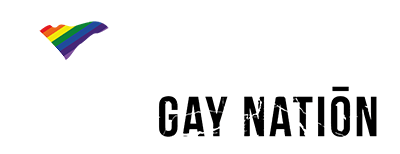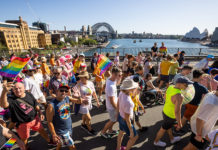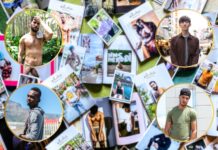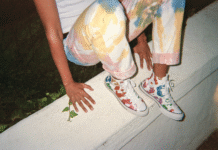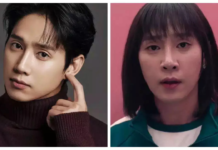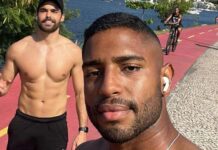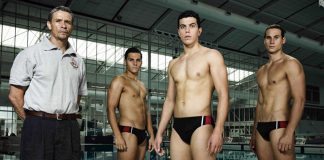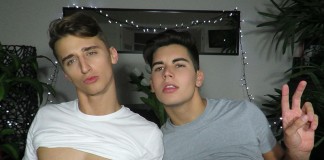
“I’m not getting changed with that queer staring at me,”
The comment was spat at me many years ago in the locker room of my secondary school gymnasium by a fellow teammate after rugby practice. As a self-conscious 14-year-old, I was shattered and confused by the homophobic remark especially when all I wanted to do was play sport. It was made very clear to me, through continued homophobic taunts and harassment, I would not be welcome to play rugby or engage with any of the other boys at my school as equals if there was any suspect of me being gay.
I stopped playing. I was unhealthy. I was unfit. I was overweight. Add that to the insecurity surrounding my sexuality and it was a recipe for misery. Over the years I gave up on sports altogether. Eventually, shortly after coming out at the age of 23, I was driven to attempt suicide. I wasn’t allowed to have a boyfriend. It was forbidden. I survived the attempt, obviously, but once I recovered from my mental relapse I decided my sexuality was no longer going to stop me from doing the things I wanted to do. I no longer cared if people found out and it was important for them to know. I now play club rugby and I’m openly out. It’s disappointing I did not feel welcome as a child because I would have loved to have been a part of it all through school.
Homophobic discrimination and abuse in sports is a very real thing. While it might not be the most pressing issue facing LGBT+ people today, it is something I feel strongly about.
I could, in reality, talk about many number of issues for LGBT+ people. I could discuss how the rate of youth suicide amongst LGBT+ is higher in comparison to straight people and how bullying and discrimination continues to contribute to this.
However, as I have joined a rugby club, I am worried about the homophobic and homonegative language used in sports. I am also concerned as sport is a very big part of New Zealand’s identity. I know a large percentage of LGBT+ youth would like to play in sports if they could, but feel it is unsafe and unwelcoming for them. It is a shame this abuse and discrimination continues in a sector of society which this nation is “proud of”.
My experiences of being targeted because of my sexuality are not isolated events either. The results of an international research project, Out on the Fields, on homophobia in sport revealed 71 per cent of kiwis think youth team sports are unwelcoming and unsafe for lesbian, gay or bisexual people. The report revealed statistics on the issue and prompted response from sporting bodies in New Zealand.
A number of experts have been consulted by New Zealand Rugby to help develop a diversity framework aimed at reducing discrimination in sports. It’s great that New Zealand Rugby is doing something about this issue and I don’t mean to detract from what it is doing, but discrimination in sports has existed for a long time prior to the report coming out.
It’s disappointing the report had to come out for action to be taken.
While the report focused on sexual orientation, discrimination based on gender identity is also prevalent. What it comes down to is that many within the LGBT+ umbrella feel unsafe and unwelcome in team sports. This is why many exclude themselves from playing. One in 5 gay men did not play youth team sports and many said it was because of negative experiences in PE class associated with fearing they would be rejected because of their sexuality. New Zealand has the second highest number of gay men to stop playing sports when they became an adult and most said it was because they feared discrimination. Whether it be verbal harassment or physical abuse, the discrimination continues to be a problem today. From my own experience, it is unnerving and damaging, to be treated in such a way. To not only feel excluded on the basis of something beyond my control, but also to be taught and treated as if there is something wrong with being LGBT+ was very damaging.
It led to self-loathing, confusion and internal homophobia. The impacts of this mentality are widespread. Excluding someone from sport, which is great for socialising and making friends, also impacts physical fitness. Sport helps engage and develop social, leadership and problem solving skills. It prompts sports players to seriously think about how to look after themselves in order to achieve peak performance. All of these can contribute to a healthier mind and state of overall well being. The benefits of sport are immeasurable.
Many LGB people stated they feared discrimination from coaches or officials. And it is very easy for those in positions of power, who aren’t LGBT+, to say there is no issue. Coaches and officials will categorically deny discriminating based on sexual orientation (or gender identity). However, just over half of gay men believed LGB people are not accepted at all in sporting culture. And almost 80 percent of participants had witnessed some form of homophobia in sports. It’s easy to say there is no a problem especially when someone is not part of the minority and do not understand what the true problem is. They might not even realise denying there is an issue is contributing to it. But would they tell someone off for using derogatory language? Would they realise that using derogatory language, even if they are joking, can be homophobic or homonegative?
Language is one of the key problems when it comes to homophobia in sports.
Many people in sports continue to use homophobic or homonegative language in a discriminatory manner without realising. Joking about someone being a “fag”, a “bumboy” or “queer” if someone makes a mistake, appears stupid contributes to the problem is part of this. An example would be when a player knocks the ball on (a big no-no in rugby) and they’re called a “poofter” for the mistake.
He’s got a bit of a flimsy wrist.
He probably takes it.
His boyfriend will kiss it better after the match.
It’s not just insults that contribute to the problem either. Assuming all players on teams are only interested in members of the opposite sex also isolates players.
Many guys will talk about the “chicks they banged” and then demand a (closeted) player tell how many women he has slept with. This is confrontational and ignorant especially if the player is not straight.
And if girls are fawning over Henry Cavill but one of the women says, actually, Scarlett Johansson is more her niche (I’m taking some liberty here so please forgive me because I don’t know what it’s like to be a woman, how they really interact or who they might be attracted to).
Assuming everyone to be heterosexual on a team can make a LGBT+ person wonder if their attractions are allowed or would be accepted on the team. And these issues are not just limited to the sports field. Many LGB people (76 percent) said an openly gay, lesbian or bisexual person would be unsafe just watching the sport in spectator stands.
It’s upsetting to know many LGBT+ people do not feel comfortable or welcome going to enjoy themselves by watching rugby, netball (or attempt to stay awake during cricket). They can’t go out with their partners without enduring either harassment themselves or homonegative taunts towards players on screen. I went to the pub to watch the rugby many times as a kid and the older men in the bar would declare any player who consistently mucks up to be a poofter, a fairy, a fag or a “bloody queer”.
It’s no good saying it was only a joke or they did not mean anything by it, the consistent use of the language in these environments is still isolating and can target LGBT+ players – in the closet or not. Imagine if someone did not realise you were of a particular race and started making racist jokes about your country of origin and all of a sudden you called them out on it. It would be very easy for them to stutter and try and retract their statements or apologise. Many, from my experience, try and brush off their comments when they are called out on it.
“It’s a joke, man. I didn’t mean anything by it. You know what gays are like,”
Why is it that young LGBT+ people feel unsafe in these environments? Where do sports teams get the idea being associated with anything remotely LGBT+ is negative?
There is a presumption about sports, particularly rugby, where it is assumed to be a masculine thing. Stereotypes perpetuate gay men are not “masculine” so can’t, or shouldn’t, play team sports which is simply not true.
All this comes back to education and learned principals. Many people are brought up on the same beliefs their parents had. It is easy for them to take these “jokes” and see them as socially acceptable. These jokes and presumptions about homosexuality/LGBT+ people also create a fear and misunderstanding of it. Many straight athletes become insecure the gay or bisexual person on their team may be attracted to them. I asked one of my friends about how he is treated by his football team and he told me:
“They seem to think all the girls want to sleep with them and the same goes for gay guys in their eyes.”
My friend is out and happily plays for the team but told me sometimes his teammates will appear reproachful or avoid making contact with him in such simple ways as a congratulatory hug. Or a tap on the back. All of this comes from a fear my friend may take the gesture the wrong way and assume it to be sexual, or the straight members fear touching someone who is out will be automatically construed as sexual by witnesses.
This is why there is a real need for proper education in schools and among young sports players and PE classes about what it means to be LGBT+. The Out on the Fields report identified this as a key solution to making the environment more welcoming. Charities like InsideOut are doing great work in this area by providing resources to schools about the acceptance of LGBT+ people.

But what about the other recommendations? The report said sporting organisations need to create strong inclusion policies so there is repercussions for those who discriminate or use derogatory language based on sexual orientation (or gender identity). New Zealand Rugby has stated it is doing something and hope to have a new diversity framework out soon.
But I’ve contacted a number of other people in positions of power, sporting bodies or not, about discrimination based on sexual orientation and all have told me it is no longer an issue.
Society has progressed.
We are more accepting now.
But are we? The report Out on the Fields report would suggest otherwise.
Yes, New Zealand has marriage equality. But that is not a benchmark for equality in society. It is merely the tip of the iceberg. There is so much more work to be done. In general society and, clearly, in sports. I think this is a big issue because sports is so ingrained as part of New Zealand culture and is a key identifier for the country.
The reason being is that straight people do not understand what it is like to be in a minority where the languages, the processes and the procedures continue to exclude, isolate and generally make someone feel unsafe and in danger for something they cannot control.
The suggestion has been made there needs to be a gay All Black in order to challenge people’s perceptions of homosexuality so we can step towards a more accepting society. As role models and in positions of power, there is some validity to this claim.
I would very much commend and be proud to have an All Black come out as gay or bisexual. However, I think it would also be great if we could also have straight All Blacks willing encourage people to stop using homophobic language and abuse. It would be proactive having strong, straight role models willing to talk about this issue and address it as a real problem.
Australian rugby player David Pocock, who is straight, stood up against Waratahs forward Jacques Potgieter after he used a homophobic slur during a match against the Brumbies. Mr Potgieter was not only fined $10,000 for the slur but also ordered to undergo awareness training by the governing rugby body. (Australia has had inclusion policies for this particular issue since 2014 which is why Mr Potgieter was reprimanded. New Zealand has yet to adopt similar policies).
Men and women in the sports field need to be taught that using homophobic slurs, even jokingly, adds to the problem. Shying away from the issue or labelling it a non-issue only makes it worse. Hundreds of men and women kill themselves every year because they fear they will be persecuted for their sexuality. Even more hide their sexuality from their friends and family only to spend their lives in misery.
These All Blacks have the power as public figures to be role models for young people today and encourage them to be more responsible and accepting. When you hear New Zealand, or Kiwis, you think the All Blacks. You think outdoor sports and hiking. And yes, of course, you think Lorde and Hobbits as well.
But the All Blacks are at the forefront of it all. They are seen as “leaders”. They’re “role models”. They’re “inspirational”. They won the goddamn Rugby World Cup twice in a row. That’s what really matters, amiright?
But no one brings up when All Black Israel Dagg tweeted the word “fag” as an insult to another player. Everyone forgets that professional rugby league player Manu Ma’u, who was labelled as inspirational in a spotlight from Sunday on TVNZ, used the term “bum boy” in a derogatory manner on the same show. And when people bring up TV host Paul Henry, no one mentions the moment when he asked why there needs to be a New Zealand gay and inclusive rugby team. Mr Henry asked why don’t they just play with everyone else?
The fact is there is a gay rugby team the same reason there are support groups and establishments in all aspects of society just for LGBT+ people to feel safe. Many fear persecution in straight areas of society.
All of these problems with homophobia in sport are prevalent in all areas of society. It’s just that gay men (almost 70 per cent) have said homophobia is more common in sports than the rest of society. There are plenty of LGBT+ athletes who want to play sport, but feel the environment is unwelcoming. Ninety per cent of gay youth remain in the closet or keep their sexuality a secret from their team. This was a higher rate than any other country who responded to the survey. But as sport is at the forefront of our nation’s identity, I would have thought we might have made it more accepting by now.
What can we do? My response is to start to go to these places and take an active role in showing people there is nothing wrong with being a part of the LGBT+ umbrella. I play club rugby in my area. I go to these bars. I participate in spectator sport. Every action I take to be a part of this community is my way of saying: I am here. I want to be a part of society even if you continue to treat me wrong for being out. It’s a bit risky, I know. But I can’t expect to be accepted if I don’t show them who I am. I do these things to show being LGBT+ should not stop me from being a part of the world and definitely not sports – which I love. How does that Britney lyric go?
If they want to know, tell them to mind their own. If they want to look, then I’ll give them an encore.
A freakshow.
The point is, by carrying and giving an “encore”, I am the change I want to see in the world. Taking part in these normally heterosexual dominated environments is my way of challenging everybody’s perception of what it means to be LGBT+. Whether someone is more masculine, feminine, gender neutral or LGBT+, it should not stop them from participating in something they enjoy.
Something needs to be done. Maybe we do need that gay All Black after all. I’m hoping that by being the only out rugby player in my club will influence change in my area. I want to inspire others and I hope every action I take in participating and being a part of the community will show people LGBT+ are not to be feared, hated or misunderstood. There are so many issues still facing LGBT+ people today, even in the socially progressive and accepting haven that is New Zealand. Making sports safer for all LGBT+ is just one more small step up a very steep mountain.
Last Updated on Feb 11, 2016
The news team for Gay Nation love tips from our readers. Got tips or a news story that you would like published? Go here to tell us something.
Visit the Gay Nation store Now

